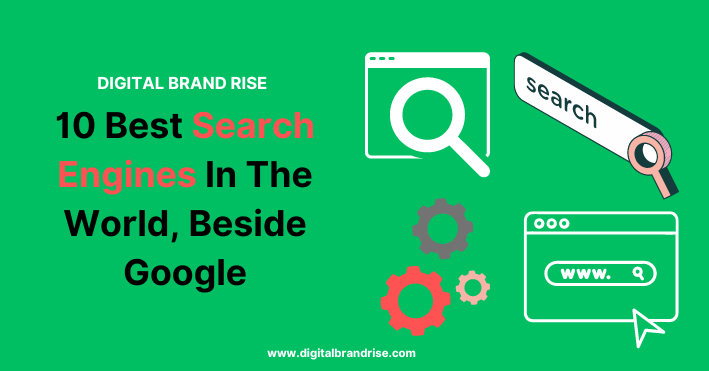For website owners, overlooking SEO is not an option. Beyond the fundamental practices, embracing advanced SEO techniques is imperative. Improving your website’s search engine ranking can lead to more visitors and income.
In April 2024, Google continued to reign supreme in the global search engine market, capturing an impressive 86.99% of all internet traffic. This shows how important Google is for getting noticed online and bringing people to websites.
But, don’t forget about other search engines. Google is huge, but don’t forget about DuckDuckGo, Yahoo!, and Bing. They can help you get noticed by different groups of people.
So, it’s important to use SEO for many search engines to get more attention online and stay ahead in the competitive digital world.
Here’s a complete guide to 15 advanced SEO tips that will boost your online visibility.
What does SEO Mean?
SEO, which stands for Search Engine Optimization, is about making your website more visible on Google without paying for ads. SEO means improving your website’s content, structure, and technical parts so it matches what people search for on Google.
It aims to make a website more important and trustworthy to Google so it shows up higher in search results when people look for related things. This brings more people to the website without paying, makes them more interested, and helps businesses make more sales.
SEO means finding the right words, making pages better, getting links, fixing issues, and making visitors satisfied. To do well in SEO, you need to know how search engines work, watch how your website does, and be willing to adapt.
For online marketing SEO is important. It helps websites and businesses stand out, connect with the right people, and achieve their marketing goals in a busy online world.
15 Advanced SEO Tips to Boost Your Online Visibility
1. Target Relevant Primary and Secondary Keywords
Keyword targeting remains paramount in SEO. But, the focus has shifted from stuffing content with keywords to targeting those that align with user intent.
Finding the right keywords that ensure your content is interesting to the people you want to reach and brings in the right visitors.
Tools like Google Keyword Planner, SEMrush, and Ahrefs can find good keywords with lots of searches and not too much competition.
2. Write High-Quality, Original Content
Content is the cornerstone of any successful SEO strategy. In 2024, it’s all about making good, unique content that helps people.
Search engines focus on content that demonstrates expertise, authority, and trustworthiness (E-A-T).
Whether it’s blogs, articles, product info, or videos, make content that helps people, gets shared, and keeps them interested.
3. Format Your Content for Readers (and Search Engines)
Optimizing content formatting is crucial for both user experience and search engine visibility. Making content easy to read with clear headings, lists, and pictures helps people and search engines understand it better.
Also, using the right words in headings and text makes it more relevant and helps it show up higher in search results.
4. Target Keywords that Trigger Featured Snippets
Featured snippets are the top results on Google that give quick answers. Getting your content in these spots can bring in lots of visitors without paying. In 2024, focusing on words that trigger these snippets can help you beat other websites.
Find questions and important words related to your topic. Then, write clear answers to these questions shortly and helpfully. This makes it more likely for your content to show up in the top spots on Google.
5. Boost CTR with Compelling Title Tags and Meta Descriptions
Writing catchy titles and descriptions is important for getting more clicks from Google searches.
In today’s competitive online world, catchy titles and descriptions can make your content stand out and make people want to click on it.
Use the right words that people search for, while also making them curious and showing them why your content is valuable. This helps get more clicks and makes your content show up higher in searches.
6. Use Short, Descriptive URLs
Optimizing URLs for clarity and relevance plays a significant role in SEO. Simple, clear web addresses with the right words help both people and search engines understand what a page is about.
Don’t use long, confusing web addresses with extra stuff in them. Instead, make short, easy-to-read web addresses that show what the page is about.
7. Get Backlinks from High-Authority Websites
Backlinks are still important for SEO. They show Google that your website is trustworthy and important. In 2024, it’s all about getting links from other trustworthy websites in your industry.
Work on making real connections, creating helpful content, and reaching out to get links from important websites. This helps your website become more trustworthy and show up better in searches.
8. Improve Your Core Web Vitals for a Better User Experience
Core Web Vitals have emerged as key metrics for assessing user experience and search engine performance. These include factors such as page speed, mobile-friendliness, and visual stability.
Making your website faster and easier to use makes people happier, keeps them on your site longer, and helps you show up higher in Google searches.
Focus on making images smaller, loading parts of the page only when needed, making code smaller, and making your server respond faster. This makes your website work better and people like using it more.
9. Use Internal and External Links Wisely
Linking strategically is important for SEO. It helps people navigate your site better and helps Google understand what your website is about.
Internal linking helps spread the value of links around your site and helps people find what they’re looking for. This makes your website easier to use and easier for search engines to understand.
Links to other trustworthy websites show that your content is reliable and important. This helps search engines see your content as valuable and relevant.
Use both links within your website and links to other websites to make a good linking plan. This helps keep people interested and makes your website show up better in searches.
10. Optimize Images, Graphics, and Other Visual Assets
Making pictures and videos better for search engines is important for making people like your website more.
Make sure pictures, graphics, and other images have good names, descriptions, and captions. This helps people who can’t see the images understand what they are, and it helps search engines understand them better too.
Make pictures smaller to make pages load faster. This makes your website work well on different devices and makes people like using it more.
11. Identify Your Most Important Organic Search Competitors
Looking at what your competitors are doing is important for making your SEO plan better.
Find your competitors by analyzing keyword rankings, backlink profiles, content strategies, and DA.
Knowing what your competitors are good at and what they’re not so good at helps you make your SEO plan better. This lets you take advantage of opportunities where they’re not doing well and stand out in your area.
12. Optimize Your Website Architecture
Having a website that’s easy to use and understand is important for people and for search engines.
Arrange your website’s content in a smart way, with easy-to-find menus and links inside your site. This helps search engines look through your site and helps people find what they’re looking for.
Use simple maps and menus on your website to help people and search engines find their way around and find what they need.
13. Add FAQs to Articles Based on People Also Ask Questions
Adding FAQ sections to your content helps answer questions people often ask and makes your website show up better in searches.
Look at questions that people ask about your keywords and topics. Then, make special sections with short, helpful answers in your content to answer those questions.
Make your content match what people are looking for and answer their questions well. This makes your content more relevant, keeps people interested, and makes it more likely to show up in the top spots on Google.
14. Find What People in Your Niche Link to
Finding good links from websites in your area is important for making your website look trustworthy to search engines.
Check which websites and content get links from many competitors or important people in your field.
Make content or do campaigns that are like theirs, to get links from the same websites. This helps your website look more important and show up better in searches.
15. Uncover and Remove Zombie Pages
Zombie pages, or redundant and outdated pages on your website, can dilute your SEO efforts and hinder crawl budget allocation.
Check your website to find and fix pages that aren’t useful anymore. You can either remove them or combine them with other pages. This helps keep your website relevant and makes your SEO work better.
Make your website’s content simpler and better, focusing on the useful pages. This helps search engines look through your website faster and make sure they show the best pages in search results.
Bottom Line
These 15 Advanced SEO tips is important for making sure people see your website and beat your competitors in 2024. You can do this by using the right words, making great content, making your website easy to use, and getting important links from other websites. This helps your website show up better in searches, brings in the right visitors, and helps you meet your goals in online marketing. Stay updated with your industry, adjust your plan when search engines change, and keep improving your SEO strategy to stay ahead.
Frequently Asked Questions
1. How to rank 1st on Google?
A good SEO plan is important. This includes using the right keywords, on-page and off-page SEO, and adapting new algorithms.
2. What are the 3 steps to successful SEO?
Keyword research, on-page optimization, and off-page optimization are essential for SEO success.
3. What are the 3 pillars of SEO?
On-page SEO, off-page SEO, and technical SEO are the three main pillars of SEO.
4. What are the two main parts of SEO?
On-page optimization and off-page optimization are the primary components of SEO.
5. What are the top SEO ranking factors?
Relevance, authority, and user experience are key ranking factors in SEO.




